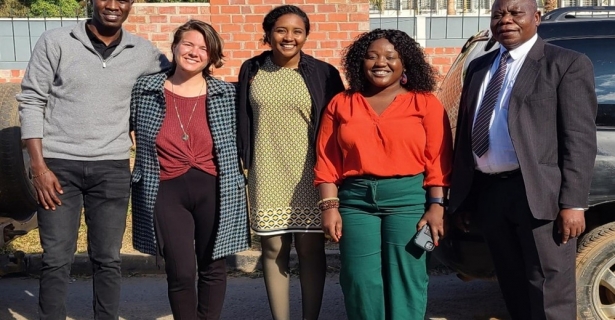We are excited to announce that we have arrived in Mongu, Western Province, after a 12-hour bus ride through the Kafue National Park. Life in Mongu is notably different from life in Lusaka: we’ve traded the hustle and bustle of capital city life for the serene tranquility of mango trees above our heads and sandy roads at our feet. We are enjoying the pleasant life of a typical Lozi family while staying in the house where Wabei grew up.
The past two weeks have been eventful! Our proposed curriculum is being thoroughly reviewed by Mr. Jack Chishala the Director of Curriculum Development at the Zambian Ministry of Education. Our team had the privilege of receiving one-on-one feedback on the design and how to best tailor it to the local context. Given the diversity of the country, we need to keep in mind both traditional and religious Zambian values and their role in everyday life.
These past weeks our team has prioritized strengthening the health of the organization by developing a strong internal structure. One bright day we pulled out flipcharts and sketched out a path forward for the organization. We watched Simon Sinek’s “The Power of Why” and asked ourselves what is the driving force behind Blesser Breakers. We envisioned what the organization would achieve in the next year and the next five years. We developed strong accounting systems and targeted goals to ensure the organization will be self-sustaining in the years to come.
Through the Tufts Derby Center for Entrepreneurs, we participated in our first CEO Scrum. We enjoyed connecting with other entrepreneurs and commiserating over the struggles of the startup journey. We were assigned a mentor, Catherine Popper, an active angel investor in the Boston area, and are excited to connect with and learn from her.
Through the power of dance, our team member Ashira connected with a local organization, AfroTwist, that is doing great youth empowerment work in Bauleni, a disenfranchised compound in Lusaka. Ashira led a group of 50+ children ranging in ages from 18 months to 8 years old in a group dance. Ashira brought back learnings to the team on how to implement public health messaging, peer mentorship, community-building, and entrepreneurship in a fun and interactive way that respects religious contexts, and cultural sensitivities and is locally led.
The challenges that we are facing are not unique to us. We connected with another D-Prize-winning team that is working on the Sugar Daddy Challenge in Eswatini. It was reassuring to hear that other organizations went through similar challenges and we strategized on how to best adapt. For instance, we learned we are not bound to stick to the proposed curriculum, but instead, we can tailor the delivery by keeping the community’s needs in mind.
We look forward to many more in-depth engagements with the community and delivering the first rounds of the pilot curriculum in the upcoming weeks.

